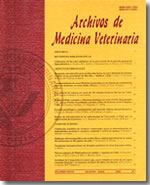Detection of infectious pancreatic necrosis virus (IPNV) in freshwater sediments
Main Article Content
Abstract
Infectious pancreatic necrosis virus (IPNV) is a pathogen of great concern in salmon aquaculture producing high mortalities in fry. Water is the most important vehicle for horizontal transmission of the virus; therefore, sediments close to aquaculture facilities could become enriched reservoirs of the virus. We developed a simple and reliable method aimed at quantifying IPNV from sediments in salmon culture areas. IPNV is extracted in a sodium pyrophosphate solution and titrated in CHSE-214 cells through the fluorescent focus (FF) method. Results showed that IPNV can remain active in fresh water sediments for weeks and that the virus can be detected in environments with a previous history of IPNV outbreaks.
Article Details
How to Cite
Labraña, R., Espinoza, J. C., & Kuznar, J. (2008). Detection of infectious pancreatic necrosis virus (IPNV) in freshwater sediments. Archivos De Medicina Veterinaria, 40(2), 203–205. https://doi.org/10.4067/S0301-732X2008000200014
Issue
Section
COMUNICACIONES

